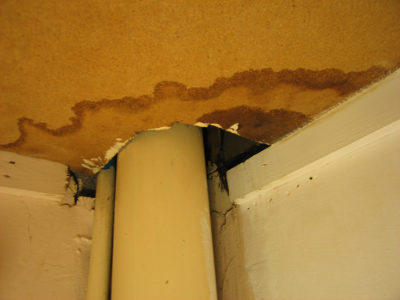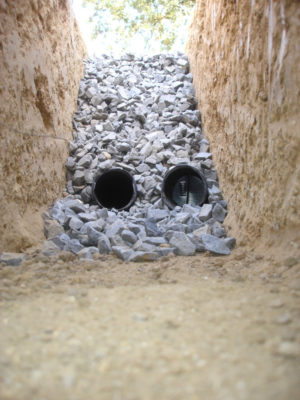French Drains in Charlotte, NC
Living in the greater Charlotte area, our residents are familiar with the occasional storms and flash floods that wreak havoc on our landscaping and neighborhoods. A French drain is designed to redirect water away from your house, like an extension of a gutter. It is a trench drain filled with gravel or rocks and a perforated pipe that keeps water from penetrating into your home and damaging its foundation.
What are French Drains?
A French drain is a covered pipe that directs water away from a specific location. What sets French drains apart from other drainage systems is that the tube is perforated and covered by gravel or rocks. The perforations allow water to flow into the drain, meaning that the pipe doesn’t require much maintenance or upkeep.
Also, since the drain is covered by rocks or gravel, it looks much more appealing than an open-air drainage system.
Types of French Drains
The design of a French drain is the same, no matter how you install it. When talking about types, we’re referring to how the drain gets covered. Some common examples include:
- Decorative Gravel: You can make the drain look like a pathway, complete with masonry on the sides.
- Loose Rocks: The drain is buried a few inches under the lawn and covered with rocks instead of soil.
- Sod: If you don’t want to carve a path of stones into your lawn, you can cover the drain with sod. However, you need to make sure that the roots won’t clog the drain, meaning that you might need to install a mesh covering over it.
Benefits of French Drains in Charlotte
The reason to install a French drain is to prevent water from pooling in a specific area around your home. If this pooling continues, it can lead to significant problems, such as:
- Foundation Settling or Cracking: As the soil erodes, your home’s foundation will settle unevenly. Over time, this settling can lead to substantial cracks.
- Sinkholes: Depending on where you live, sinkholes may be relatively common. Pools of water can erode the ground and make sinkholes more likely.
- Dead Spots: Overwatering can drown plants and grass, leading to dead spots on your lawn.
Cost of Installing French Drains in Charlotte
Although the design of a French drain is simple, there are a few factors that can affect the installation cost, including:
- Length of Drain: The longer the drain, the more dirt that needs to be excavated and the more gravel necessary to put on top.
- Location of Pooling: If water is collecting next to your home’s foundation, it can be trickier to install a drain at that point.
- Grade Level: French drains have to slope downward so water will flow away from the problem area. If the ground slopes upward, more digging is necessary.
Free Moisture Inspection
How to Identify a Water Problem

If you don’t know whether you have moisture control measures in place, call a professional to schedule a routine inspection or take a look yourself: Walk around your house after it rains and see if you have any water pooling in the yard. Check the soil surrounding your house to see if it is catching water and find out what direction your soil slopes. You need the soil around the foundation of your home to slope away from the house, ideally putting your home on the highest point of your property. When water pools against your house, it can be absorbed into your home’s foundation, bringing moisture inside. If this is the case, call the professionals at Carolina Pest Management as it needs to be fixed immediately.
- Mold and Mildew
- Damaged Flooring
- An Unpleasant Smell
- Standing Water
- Rusty Pipes
- Water Stains
Our Moisture Inspection Process
At Carolina Pest Management, we provide preventative measures to save you and your family from the heartbreak of water damage. Given the opportunity, one of our moisture control specialists can come to your house and inspect your home to recommend new or replacement moisture control products. Our goal is to find a solution that will work best for your home, property and budget. We want to protect the things that matter most, so give us a call to schedule an appointment today!
Moisture Control Treatment: French Drains

There are several different ways to help with moisture control in your home, and French drains are specifically designed to move water away from your house. By installing a French drain, you are helping prevent water and moisture from entering the home, which protects your foundation from decay, making it less inviting to termites and other pests. Older homes and areas with heavy rain are more susceptible to water damage, however all homeowners should be cautious as moisture control is an important aspect of home maintenance, no matter when or where your house was built.
French Drain Maintenance
Luckily, French drains are easy to clean and require minimal maintenance once installed. We recommend checking your French drain for clogs or built up debris approximately once per year. Call one of our friendly technicians to clean or inspect your French drain for you!
French drains are installed in 6 easy steps:
Step One: Dig a Trench - You'll need to measure the distance and slope to figure out how much digging is required.
Step Two: Lay Gravel in the bottom of the trench. If deemed necessary, also lay fabric to prevent roots from intruding.
Step Three: Lay the Pipe - You can use PVC or flexible piping. PVC lasts longer, but it's more expensive. You may also have to drill holes to allow water to flow through.
Step Four: Cover the Pipe - Put more gravel on top of the pipe. If deemed necessary, also lay fabric to keep out roots.
Step Five: Install a Sump Pump - Not all French drains need a pump, but those with grading issues will need a boost to get water to flow out.
Step Six: Cover the Drain - If you want an "invisible" French drain, you can cover the gravel with sod. Keep in mind that maintenance will be harder, and roots might eventually clog the pipe.
Frequently Asked Questions: French Drains
What is a French drain?
Despite the fancy name, French drains are relatively simple setups utilized to get excess water away from your home’s foundation. Installing a French drain involves digging a sloped trench that is filled with small gravel surrounding a perforated pipe. The pipe will redirect water away from the house to an appropriate spot for drainage. French drains work to remove standing water outdoors and will keep a basement dry year-round.
Do French drains require a lot of maintenance?
No. However, for French drains to work properly, the water must be able to move freely through the pipe. Over time, the pipe may have sediment buildup that affects the flow of the water. Clearing the pipe of the sediment from time to time is the only maintenance required.
Are French drains appropriate for all properties?
The effectiveness of a French drain depends largely on whether your property’s soil is porous enough; if you have clay soil than a French drain will probably not control your property’s moisture levels adequately. Therefore, while almost always helpful, a French drain is not the ideal solution for all homes. A property should be inspected and evaluated by a professional before a French drain is installed.
Charlotte French Drains Technicians
Professionally installed French drains help you get moisture issues under control quickly and efficiently. Our professional French drain technicians have in-depth experience evaluating homes, foundations, and the surrounding landscape to determine whether or not you need a French drain and where it should be placed. When your Carolina Pest Management technician installs your French drain, you will have a worry-free way to stop water from penetrating your home’s foundation.



